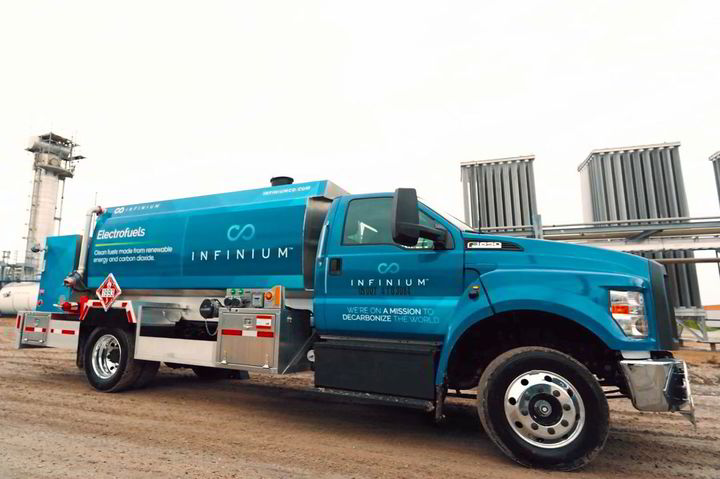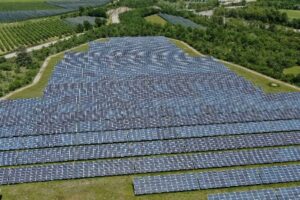World’s first commercial e-fuel plant opens, producing diesel from green hydrogen — backed by Bill Gates and Jeff Bezos

The world’s first commercial-scale e-fuel plant has begun operations in Corpus Christi, Texas, producing e-diesel made from green hydrogen and captured CO2 for Amazon trucks.
California-based Infinium’s Pathfinder facility takes green hydrogen produced from wind energy, adds CO2 captured from an adjacent Howard Energy Partners gas processing facility to produce syngas, which is then processed via the start-up’s proprietary liquid fuel production process (that requires its patented catalysts).
The resulting e-diesel will be used as a drop-in fuel by existing Amazon trucks, but will be far more expensive than fossil diesel.
Amazon made an early investment in Infinium back in January 2021, while Breakthrough Energy Ventures — backed by billionaires including Bill Gates and Amazon founder Jeff Bezos — is also an investor.
Gates visited the Pathfinder plant yesterday, writing in his GatesNotes blog: “The key to Infinium’s approach is that their fuels can be dropped into existing engines. That’s huge. It means that companies won’t have to adapt their fleets, removing one of the biggest hurdles to transitioning to a new fuel.
“Sometime soon, if you live in the area, you might get [an Amazon] delivery supported by Infinium eDiesel.”
Article continues below the advert
Infinium has revealed little about the project in terms of its size or annual output, or the cost of the e-diesel, and is yet to respond to questions from Hydrogen Insight.
But according to Gates, the Corpus Christi facility is a “demonstration plant”, and that the company’s Project Roadrunner facility — being built at an old gas-to-liquid plant in West Texas, backed by a $75m investment by Breakthrough Energy — “will increase the company’s capacity for producing eFuels ten-fold”.
The only other operational e-fuel facility in the world is HIF Global’s Haru Oni pilot project in southern Chile, which shipped 24,6000 of synthetic gasoline to the UK for use in Porsche race cars.
The initial e-fuel from that plant cost about €50 per litre to manufacture, according to a report from the Potsdam Institute for Climate Impact Research last year, which was 100 times more than the typical wholesale price of fossil-based gasoline. However, that project uses carbon dioxide captured from the air — a far more expensive and energy-intensive process compared to Infinium’s piping of captured CO2 from an adjacent facility.
“As both a technology innovator and a project developer, we have end-to-end control of the eFuels production process,” said Infinium CEO Robert Schuetzle. “This gives us a constant feedback loop that enables us to rapidly accelerate additional projects and scale our global production of eFuels.”
Infinium says it has more than a dozen projects under development in the US, Europe, Japan and Australia, but it has only announced three. In addition to Pathfinder and Roadrunner, the third is the Reuze project in Dunkirk, northern France, which it is co-developing with French utility Engie.
That project will use a 400MW electrolyser to produce green hydrogen that would be combined with CO2 captured from a nearby steel plant.
HIF Global has been given the green light by local authorities to build a massive e-fuel plant in southern Texas that would require 1.8GW of electrolysers, where the company plans to start construction this year.
Is e-fuel a good idea for road transport?
A coalition of green groups said last year that “making e-fuels for road transport would be an unacceptable waste of renewable electricity” and very expensive.
“Even with an optimistic approach, a driver with a synthetic gasoline car in 2030 would spend €10,000 [$10,860] more than a driver with a battery electric car over five years,” the coalition wrote in a press release, describing that “as an unapproachable price difference for most Europeans”.
When a battery electric vehicle is powered by renewable energy, 77% of the initial power is used to turn the wheels.
“In the case of e-fuels, the efficiency is only 20% for electro-diesel and 16% for electro-gasoline,” the group explained.
By contrast, e-fuels are likely to be necessary to decarbonise aviation as battery options would be too heavy for long-distance flights.






